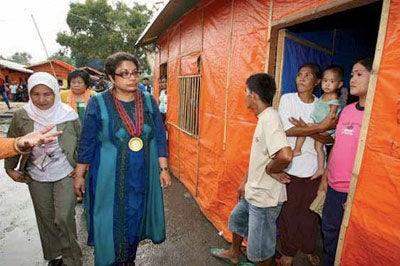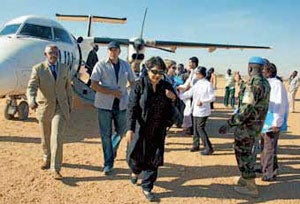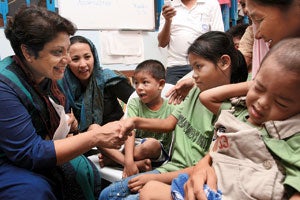Last spring, a young woman named Grace Akallo sat in the U.N. Security Council chamber and told its delegates her story. In 1997, when she was 15, soldiers of the Lord’s Resistance Army abducted Akallo from her school in northern Uganda. She learned to use an AK-47 in battle and shot other girls who tried to escape, so as not to be shot herself by the rebel commanders. She was repeatedly raped over the course of seven months, until one day when the LRA was under attack, she herself escaped. When she finished telling her story, she asked the delegates to help bring home other girls and boys who hadn’t been so lucky.
Sitting at Akallo’s left in the chamber was Radhika Coomaraswamy LL.M. ’82. As U.N. special representative for children in armed conflict, Coomaraswamy hears stories like Akallo’s regularly.
The U.N. estimates that there are some 250,000 children involved in armed combat in Africa, Asia and parts of Latin America, whether as fighters, porters or sex slaves. It’s her job to bring their stories to the attention of the world and to use all of the tools available to end impunity for such crimes.
Coomaraswamy was first appointed to the position in 2006 by the U.N. secretary-general. The office had been created 10 years earlier, after a study commissioned by the secretary-general—the Machel Report—brought international attention to the reality of child soldiers. It described a world of new wars, in which lighter weaponry made it easy to put children on the front lines. “Twenty years ago weapons were too heavy for children to carry,” says Coomaraswamy. “But now a child can not only carry an AK-47 but master its use in 45 minutes.” At the same time, in these new wars, combatants do not recognize the Geneva Conventions; they go after whole communities, enlisting children and women. In fact, she says, today the majority of deaths in any given armed conflict—from Afghanistan to the Congo—are of civilians.
It was her predecessor, Olara Otunnu LL.M. ’78, the first special representative, who established an essential framework to end impunity for these crimes against children: Resolution 1612. In accordance with the resolution, country-level task forces monitor and report on violations every two months. “We call it the ‘naming and shaming list,’” says Coomaraswamy. Until 2008 it comprised names of member states that recruit and use children as soldiers. Since 2009, it has also included states that commit sexual violence against children and kill and maim them.
Coomaraswamy brings these violations to the Security Council and pushes for action—the next step, she says, is the creation of a special sanctions committee.
She also visits countries herself to put pressure on governments, rebel groups and military leaders.
“What you must realize,” she says, “is that a lot of these rebel leaders expect to become leaders of their countries someday, so they don’t want to be on any list, and they don’t want the possibility of sanctions.”

That ended up being the case when she went to the Central African Republic and met with a commander of the APRD (Armée populaire pour la restauration de la République et de la démocratie), although in the moment—they had traveled deep into the jungle and there was shooting all around—she wasn’t sure where the negotiations would lead. “He was not aware that he was on the list, and he got quite agitated,” she recalls. The moment was “quite tense,” but eventually he agreed to give up the 400 child soldiers in his forces, and a few months later, he did.
She has had similar success in other countries, including the Philippines and Nepal. Working closely with U.N. employees on the ground and national NGOs, she’s made more than 17 country visits since her appointment. “Not all groups respond,” she says. “There is the Taliban and there are others we don’t have full communications with. But quite a few have entered into negotiations with us because of the Security Council process.”
In the struggle to end the recruitment of child soldiers, Coomaraswamy believes international prosecutions like those at the International Criminal Court—although it can take on only a few cases—play a role. It has to do with deterrence, she says, thinking of the reaction she’s gotten during her field visits. People are obsessed with the ICC, she says. “They ask, ‘Why are people being prosecuted?’ And, ‘What does it mean to be prosecuted there?’”
It also has to do with “setting the standard.” In the ICC’s first case to go to trial, Chief Prosecutor Luis Moreno-Ocampo has charged Democratic Republic of Congo rebel leader Thomas Lubanga with “conscripting and enlisting children” and “using them to participate actively in hostilities.”
So much is being worked out, says Coomaraswamy, in the interpretation of these charges.
In 2008, she wrote an amicus brief, and earlier this year she testified before the court in the case that is still ongoing, arguing for a broad interpretation of the words “to participate actively in hostilities” that would cover the multiple roles imposed on children in war, in particular girls. “[They] are fighters one minute, ‘wife’ or sex slave the next, and domestic aid and food providers at another time,” she wrote.
In her brief for the ICC, she also parsed the language “conscripting and enlisting,” stressing that they are both forms of recruitment. Many children, she says, like Grace Akallo in Uganda, are abducted into armed conflict. But in other parts of the world, children join voluntarily, sometimes because of need, she says, recalling a trip to the southern Sudan, where leaders of the Sudan People’s Liberation Army turned over orphans who had come to the camp desperate for food and willing to enlist to get it. Sometimes they enlist out of a desire for revenge; many children have seen their parents murdered, their sisters raped. “We don’t distinguish,” she explains, “because we feel that if you are a child, you are too impressionable to volunteer.”

It is U.N. policy that people should not be tried for war crimes they committed as children. The Special Court for Sierra Leone and the ICC, the first international courts to try child soldier cases, have followed suit. Children who have committed crimes in these wars must come to terms with what they have done, she says, perhaps through mechanisms of restorative justice, but they should not be subject to criminal prosecution.
Many states follow this policy when it comes to national law. Coomaraswamy says the issue has been raised with the United States regarding young people detained in Guantánamo; so far the U.S. has released all of them except one.
Coomaraswamy says terrorism and anti-terrorism are increasingly affecting children. In March, she returned from a trip to Afghanistan, where the Taliban used seven children as suicide bombers in 2009. She is also concerned with allegations that Afghan forces are recruiting minors. During the trip, she secured ongoing access to recruitment and training centers in an attempt to stop the practice. And when she met with Gen. Stanley McChrystal, after a year when 131 children were killed by airstrikes, “collateral damage” was high on her list. He convinced her that he was committed to reviewing military strategy to better protect civilians. But during the very week of her visit, an airstrike killed children, and Coomaraswamy will continue to push for review of these tactics. In addition to meeting with top military officials and President Hamid Karzai, the special representative also talked to children who had fled fighting in Helmand Province. They were 6 and 7 and 8, but they used the word “martyr,” she says. “I don’t think we realize how much the discourse of resistance is in children’s minds.”
The solution, she says, can’t just be military but must address a range of problems. She was struck by how much the children, especially the girls, loved attending the school set up by UNICEF in the camp: “When you asked them about going home, they said, ‘No, no. We’re very happy here.’”
Coomaraswamy herself first came to the U.S. from Sri Lanka (then Ceylon), when she was a girl and her father’s position with the United Nations Development Programme brought her family to New York. After 17 years, and degrees from Yale and Columbia (the HLS degree would come later), she returned to her home country in 1976 and worked there for more than 30 years, as a human rights advocate and then as U.N. special rapporteur on violence against women to the U.N. Commission on Human Rights. “It was during the worst of the war,” she says, referring to the battles between Tamil insurgents and the government. “I spent a lot of time fighting for human rights, and for women’s rights and for ethnic harmony in that country.”
That gave her firsthand knowledge of the sort of disruption that affects the lives of the people for whom she now advocates. They are so often “afraid of the Western imposition,” she says. “And when I say, ‘I understand what you’re going through because I come from Sri Lanka,’ the tone just lowers.”
According to Coomaraswamy, one of the highlights of her work is getting to know extraordinary people like Grace Akallo, “who have gone through hell but have come through it.”
When she’s asked what’s hardest, the U.N. special representative laughs: “That I have to be well-behaved.”
“I am just joking,” she says. “But on these issues [you feel] so much outrage—you can manage that and control it, and put it into diplomatic language. But I come from more of an activist background.” Yet in the U.N. system, “if you become too activist, you create a backlash,” she says. “If you want to get much done … you have to push. You have to constructively engage and push.”
New book focuses on children’s role in transitional justice

Today around the world, children are among the most affected by war. Yet until recently, transitional justice tools—from international and national prosecutions to truth-telling commissions—have paid little attention to their experience.
A new book, “Children and Transitional Justice: Truth-Telling, Accountability, and Reconciliation” (Harvard University Press), edited by Sharanjeet Parmar; Mindy Jane Roseman, Harvard Law School Human Rights Program academic director; Saudamini Siegrist; and Theo Sowa, is part of recent efforts to change that.
At a panel at HLS marking the launch of the book—a collaboration between UNICEF and the school’s Human Rights Program—Dean Martha Minow called it a remarkable collection that will have “repercussions for restorative justice, but also retributive justice as well as community building.” From the first cases in international courts focused on crimes against children to involvement of children in Liberia’s truth-telling commission, the book looks at recent efforts to bring accountability and healing and to protect the rights of children in the process—especially when the participants have not only been victims of violence, but perpetrators. It makes the case that if we are to prevent mass atrocities and help child victims of war, robust educational and economic opportunities must be part of the solution.
Archbishop Desmond Tutu, participating on the panel via videoconference, agreed that children must be given such opportunities. He also expressed wonder at children’s resilience: “When you think that they are going to be just casualties, burnt up by a lust for revenge, you are so humbled by how they can be so magnanimous—wounded healers of other wounded persons. I pray this splendid collaboration between Harvard and UNICEF will blaze a new trail in dealing with post-conflict situations.”
